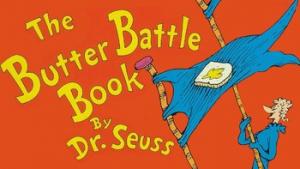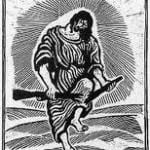There’s a strangely escalated form of bravado that is commonplace. Escalation is so obvious, we hardly even see it anymore. De-escalation seems cowardly. Fear is as commonplace as are our attempts to hide it. Certainly, there is a need to challenge and even to oppose. But, I have witnessed a hardening of the heart in the strong and the brave. Boldness and courage are seen through machismo and violent examples. As a generation has grown to adulthood without knowing a time without warfare, rockets and drone strikes, tanks, and snipers have all become commonplace, and don’t forget live shooter drills in schools. I’m tired of war becoming normal. And, I do not want guns in church. Worse than commonplace, violence seems “natural”. If someone comes at you with violent intent, your job, the rationale goes, is to get a bigger weapon. Has no one read Dr. Seuss’ Butter Battle Book?

Blessed are the peacemakers, for they shall be called the children of God (Matthew 5.9)
So we have known and believe the love that God has for us. God is love, and those who abide in love abide in God, and God abides in them. Love has been perfected among us in this: that we may have boldness on the day of judgement, because as he is, so are we in this world. There is no fear in love, but perfect love casts out fear (1 John 4.16-18a).
Without Batting an Eye: A Fable
When his advancing army stormed into a small town the general called his scouts before him, “where are the citizens of this village?” he demanded.
“They have all fled in fear,” the scouts replied.
“Is there no one left to pay tribute?” the general shouted.
“No one but the priest. He remains in the temple.”
Quickly the general marched into the temple, burst through the doors and demanded to see the priest. After a search, the priest was found reading quietly in his study. The general, angry that the cleric refused to greet him as a conqueror, shouted, “Don’t you know that you are looking at one who can run you through without batting an eye?”
“Don’t you know,” the priest replied, “that you were looking at one who can be run through without batting an eye.”
For a moment the soldier stared in disbelief at the priest. Then slowly, a smile danced on his lips. He bowed low and left the temple (Stories for the Journey, pg 95).
Love Over Fear
I know that this tale feels like fiction, yet it is also the story of numerous people who have also looked into the face of violence and chosen love over fear, serenity over anxiety, and a deep trust in what may come that transcends the momentary feelings of anxiety. Love over fear.
No one comes to the without-batting-an-eye orientation without some deep reservoir filled with preparation and formation. Resilience and restraint in the face of opposition can be perceived as weakness. But bravado and challenge only exacerbate the tension and prolong the conflict. How often do I jump into an argument, a provocation, rather than allowing my own centeredness to maintain my composure?
Certainly, there are things which call for an immediate challenge, especially when we witness the oppression and injustice done to another who cannot speak for herself or himself. But what is the immediate response that is called for?
Years ago, I was part of a small delegation of religious leaders from my state who met the Dali Lama. There are many things about this man that truly seem divine and radiant. At one point, during a question and answer session, the Dali Lama was asked about how to stop a person who was committing violence, since he, the Dali Lama, was an avowed pacifist. The assumption in the question was that pacifism was impotent to stop the violence. The Dali Lama espoused the need to stop the perpetrator from harming others or harming himself (and since all things are connected, harming others is harming oneself). The method would be to embrace the violent perpetrator. Without batting an eye.
A few months ago, a student with a shotgun intending to shoot himself in a Portland, Oregon, area high school. As the student walked carrying the weapon, Keanon Lowe, a security guard and coach at the school simply approached the student and embraced him. Certainly, we can in hindsight say that he was not there to hurt others. But if you were to see a student carrying a shotgun in a school hallway, first reactions would not be to embrace the student and disarm him peacefully, lovingly. Love over fear.
The Other MMA
Writing for the Conrad Grebel Review, a Mennonite publication from the University of Waterloo (Ontario, Canada), Steve Thomas describes his attempts to use the spiritual and nonviolent resistance attributes of martial arts. Thomas explains:
“In contrast to the blood sport of Mixed Martial Arts (MMA), we promote Mennonite Martial Arts, mixing traditional martial arts with conflict transformation skills as a form of embodied peacemaking. We refer to our way as “the other MMA.” Learning physical skills, sparring, participating in problem-solving exercises, and role playing help develop the capacity to engage conflict and violence.” (Martial Arts as a Model for Nonviolence: Resisting Interpersonal Violence with Assertive Force ). Learning skills to de-escalate violence is crucial in healthcare, especially in mental health care in which patients may have violent outbursts.
Thomas goes on to describe this notion of nonviolent resistance. This is not an idealized concept, but actually arises in part from an attack on his wife. Thomas goes on to relay the story of a South African woman seeking to find a way to seek peace in the midst of violence and personal attacks, “Surely we must protect them but also show some level of empathy for the lost souls who attack us . . . they too have their story.” Immediately, most evident in her response is a consideration of the attacker. In most circles people do not care one bit about the attacker. In becoming violent, they have removed themselves from all consideration of empathy and kindness. And rightly so, some may think, at least in some ideas of retributive justice.
But Christian justice must look more like Kennon Lowe, like Jesus. Love is where peace is constructed. Fear is where retribution, revenge, and violence is born. Love over fear.
Want Craig to come speak at your church, provide a workshop or a retreat? Send an invitation HERE
For more resources from Craig, check out The Missionplace.
And, although we’re on hiatus, subscribe to
The All That’s Holy: Blue Collar Podcast available on iTunes.












